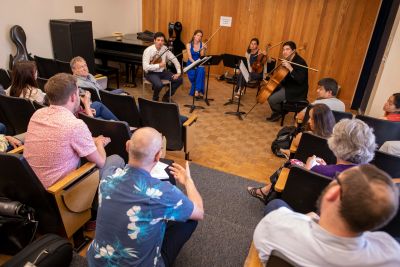Musicians from all over the world ranging in age from 18 to 82 arrived on the Stanford campus to participate in the 10-day St. Lawrence String Quartet (SLSQ) Chamber Music Seminar.
Although each of the 75 musicians brings a unique background and musical goals, all share an eagerness to work directly with the SLSQ, Stanford’s ensemble-in-residence. Established in Toronto in 1989, the quartet took first prize in the Banff International String Quartet Competition in 1992 and joined the Stanford faculty in 1998. Since its inception, the St. Lawrence has drawn praise for the intensity of its performances, its breadth of repertoire and its commitment to community building through music and education.

Image credit: L.A. Cicero

Image credit: L.A. Cicero

Image credit: L.A. Cicero

Image credit: L.A. Cicero

Image credit: L.A. Cicero

Image credit: L.A. Cicero

Image credit: L.A. Cicero

Image credit: L.A. Cicero

Image credit: L.A. Cicero

Image credit: L.A. Cicero

Image credit: L.A. Cicero
The SLSQ Chamber Music Seminar brings each facet of the SLSQ’s mission together. Every summer, the quartet hosts professional and amateur musicians for an intensive program of coaching, rehearsals, concerts, and classroom sessions with performance and instruction known as masterclasses.
“Trying to describe the SLSQ Seminar is like trying to describe the Grand Canyon: words fail. I can say it’s fun and all-consuming and rewarding, but none of those words really capture what it’s like to be immersed in chamber music and marinate in the most energetic and inspiring environment,” says seminar participant, violinist and emergency physician Christine Choi.
The summer seminar is designed for musicians with a serious ongoing interest in chamber music and it follows a rigorous schedule of study and performance in a uniquely supportive environment, blending advanced students destined for careers in performance with dedicated adult musicians.
During the seminar, participants receive instruction from members of the SLSQ as well as guest faculty, who this year includes Michael Kannen, Maria Lambros, Asbjørn Nørgaard, Frederik Øland, Paul Groves, Pedja Muzijevic, Stephen Prutsman and Alasdair Tait. Participants focus on one or two major works in chamber music literature while learning the delicate art of cooperation as part of an intimate group. Despite the packed schedule, participants can be found well into the night sight-reading chamber music with friends and coaches.
“Chamber music is a microcosm for life on every level. You learn how to speak to people, you learn a collaborative working process, you have a common goal but four different voices, you learn a lot about life and being a human being by playing chamber music,” says Lesley Robertson, violist with the SLSQ.
There are three noontime concerts by the seminar faculty and two weekend participant concerts throughout the seminar. They are free and open to the public. The remaining concerts in Bing Concert Hall are Wednesday, June 26, and Friday, June 28, both at noon.
The weekend concerts are the International Showcase on Saturday, June 29 at 5 p.m. in Campbell Recital Hall, which features a selection of the participating ensembles, and the Marathon Finale on Sunday, June 30 at 11 a.m. in Campbell Recital Hall, which includes all 23 of the ensembles. This marathon performance is expected to last more than four hours, so patrons are welcome to exit and re-enter in-between pieces.